RI towns are in for a big payday. Here's how your town's spending COVID-relief money.
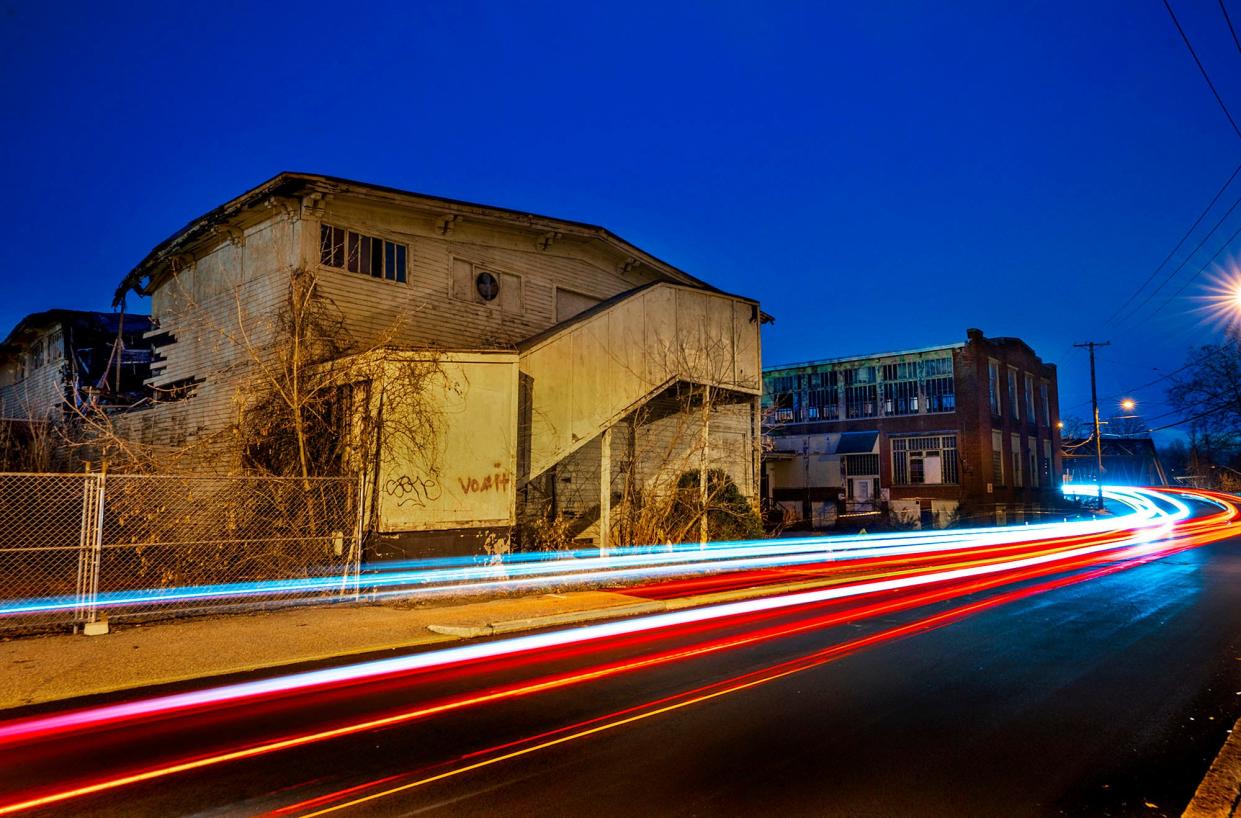
The General Assembly has been under increasing pressure to start spending more than $1.1 billion in aid that Rhode Island has received under the American Rescue Plan Act.
Much less attention has been paid to the fact that individual towns and cities are also receiving a massive injection of federal funds — and many have yet to take advantage of the windfall.
The Providence Journal asked the state's 39 municipalities about their plans for the money. Here's a breakdown of what each is expected to receive, according to the office of General Treasurer Seth Magaziner, and what they've spent so far.
Information on how funds have been spent or allocated was provided by officials in each city and town, except where indicated.
Barrington
Total expected: $4.8 million
Total committed: $1.6 million
Where the money is going: $1,600,000 has been set aside to upgrade the East Providence Wastewater Treatment Facility in Riverside, which Barrington shares with East Providence. The two towns are splitting the cost.
Barrington is also spending $22,320.01 to replace its "archaic" website, which last underwent a major update in 2014. CivicPlus, a Kansas-based company that created municipal websites for South Kingstown and Westerly, will be designing the new site.
What's next: Barrington has set up a "virtual suggestion box" to get residents' input on how to use the remaining money, and established an ad hoc committee to review those recommendations, according to Town Manager James Cunha.
Ideas under consideration include sidewalk and streetlight improvements, and directing funds toward housing, parks and recreation, Cunha said.
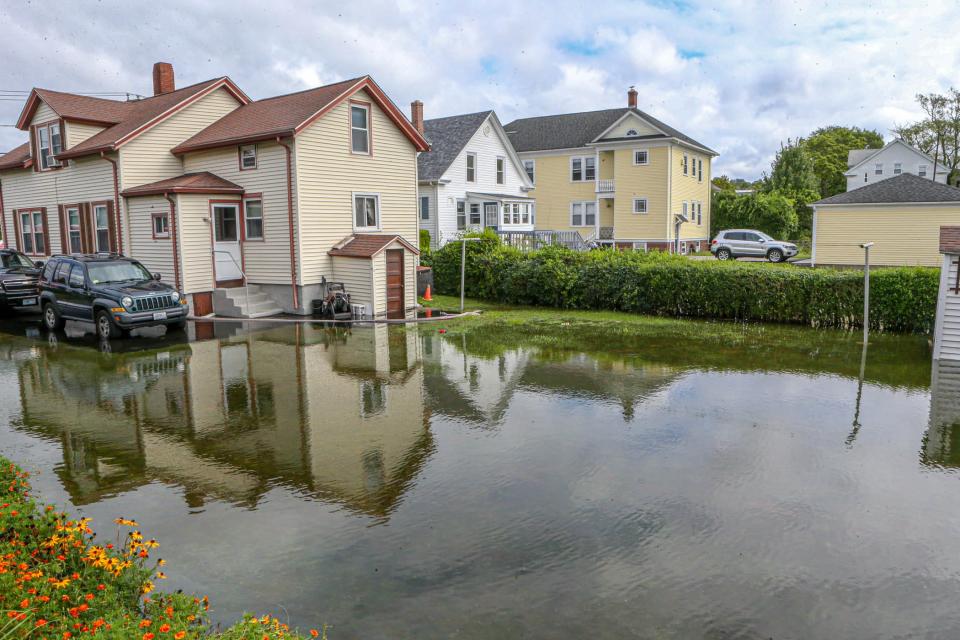
Bristol
Total expected: $6.55 million
Total committed: $6.5 million
Where the money is going: Bristol appears to be the only town in Rhode Island where virtually every dollar of the ARPA funding is already spoken for. The Town Council approved a list of projects recommended by individual department heads earlier this year, said Town Administrator Steve Contente.
Dealing with flooding is a major theme: An estimated $3,715,000 is going to Phase 2B of the Tanyard Brook project, an ongoing effort to address persistent flooding and drainage issues in a large swath of the town. Another $450,000 is going to improve drainage around Collins Street and Foxhill Avenue, which experience some of the worst flooding.
An additional $550,000 will go to a project designed to manage and treat stormwater that flows into the east branch of polluted Silver Creek, while $200,000 will go toward improving drainage infrastructure nearby to prevent roadway flooding. And approximately $250,000 is dedicated to "end-of-road retrofits," which are designed to remove asphalt and improve drainage at the ends of roads that end at the water.
Additionally, $800,000 will go to creating broadband infrastructure, and $525,000 will go toward upgrading HVAC systems in public meeting spaces.
What's next: The projects are currently in the design and permitting stages, Contente said.
Burrillville
Total expected: $5 million
Total committed: $0
What's happening:
Burrillville likely won't decide how to allocate all of its ARPA money until July or August of 2022, according to Town Manager Michael Wood.
That's because the town envisions using the funds for sewer and water infrastructure projects that will require gathering estimates from engineers, and getting approval from the state Department of Environmental Management.
Burrillville held three public hearings this fall to solicit suggestions and plans to schedule a final one in January. Community members can also make suggestions at any regular Town Council meeting.
The proposals that come in have been divided into four categories: utilities and infrastructure; broadband; business and economic development; and a catch-all encompassing tourism, nonprofits and everything else.
A dedicated subcommittee has been set up to sift through the ideas that are submitted for each category, Wood said.
Central Falls
Total expected: $5.8 million
Total committed: $332,000
Where the money is going: An initial $300,000 has been allocated to make up for revenue losses in the the city's fiscal year 2022 budget.
Additionally, $25,000 has been set aside for a contract with Beta, a compliance firm, "to ensure all ARPA spending is in compliance with federal rules," said Sarah Dell of Advocacy Solutions, which handles communications for the city.
The city is also giving $5,000 to the Central Falls Panthers football team and $2,000 to Central Falls Youth Baseball, with the goal of "providing an important healthy outlet for local families during this pandemic," Dell said.
What's next: It's now up to Mayor Maria Rivera to review the recommendations outlined by the advisory council that she created earlier this year, and coordinate with Beta to figure out future spending.
After a series of meetings this summer, the advisory committee suggested allocating $1.7 million to the public works department, $900,000 to the planning department, $700,000 to the fire department, $500,000 to the legal department, $400,000 to police, $250,000 to parks and recreation, $150,000 to the city clerk, $120,000 to the office of constituent services and health, and $50,000 to community outreach.
Ideas proposed by the individual departments had ranged from offering $50 Visa gift cards as incentives for getting vaccinated, to buying Tasers and unmarked police cars, to providing housing for victims of domestic violence. The committee opted against deciding which of those projects should be prioritized.
"Due to the technical nature of the work of each department, the prioritization of what funds go where is better left to the professionals in charge," the committee wrote.
The advisory committee also suggested setting aside $650,000 in the next budget to fund projects suggested by citizens. Central Falls has set up an "ARPA Transparency" webpage where residents can see how funds have been spent so far, and email their suggestions.
Charlestown
Total expected: $2.3 million
Total committed: $0
What's happening: "We’re playing it slow," said Town Administrator Mark S. Stankiewicz.
The small town has an equally small staff, and those employees have limited bandwidth and aren't necessarily "attuned to all the ins and outs of federal regulations," Stankiewicz said. As a result, Charlestown will likely hire an outside consultant to figure out how to best use the money without running afoul of any guidelines.
While other communities have invested in upgrading municipal water and sewer infrastructure, Charlestown doesn't even have those facilities in the first place, Stankiewicz pointed out.
Input from community members will be solicited at some point, but Stankiewicz says he wants to first get a clearer understanding of what uses are allowed.
"It’s a pie that everyone wants a slice of," he said. "And the pie is limited."
Cranston
Total expected: $42.6 million
Total committed: $7.9 million
Where the money is going: A total of $7,871,661 million was used to balance the city's budget, filling holes caused by pandemic-related revenue shortfalls.
What's next: The city administration and council are in the processing of deciding what comes next, said finance director Robert Strom. Infrastructure, sewer and broadband projects are all on the table.
The council voted on Monday night
to hold a series of public workshops, conduct a survey, and put together a report with the findings, "in order to inform the Council as it approves the prioritization of the highest and best use of Cranston’s ARPA allocation."
Coventry
Total expected: $10.4 million
Total committed: $0
What's happening: A public meeting to solicit residents' ideas will be held on Jan. 10, officials said at a recent Town Council meeting.
Cumberland
Total expected: $10.5 million
Total committed: $0
What's happening: Cumberland solicited ideas from residents through a survey on the town's website and plans to put together a proposal soon, according to Mayor Jeff Mutter. Two public hearings and workshops will be held with the Town Council at a yet-to-be-determined date.
East Greenwich
Total expected: $3.9 million
Total committed: $208,500
Where the money is going: Upgrading outdated IT systems, including network switches and routers.
What's next: East Greenwich is one of the few towns with a detailed proposal
for how each dollar of the funding should be used.
Town Manager Andrew Nota has suggested devoting the largest chunk of money, $1.3 million, for upgrading aging wastewater infrastructure, including sewer mains on Main Street and the sewage plant's ultraviolet disinfection system.
Nota also recommended spending $700,000 to relocate the town's transfer station and fueling station for municipal vehicles, which are both located on the edge of Greenwich Cove and considered highly vulnerable to rising seas from climate change.
Another $700,000 would go toward improving ventilation and HVAC systems across town-owned buildings. An estimated $500,000 would buy new dispatch consoles for the fire and police departments.
Additionally, $150,000 would go toward upgrading the police department's outdated camera surveillance system, and $39,960 would be used to update the audio system in the council chambers.
The plan also includes building sidewalks that would allow students to walk to school ($200,000) and building open-air pavilions at public parks and the high school athletic complex ($150,000).
Presented for discussion in October, the proposal may undergo "a few possible minor modifications" before being finalized in January, Nota said. That will require a vote of the council, and the public will be invited to weigh in.
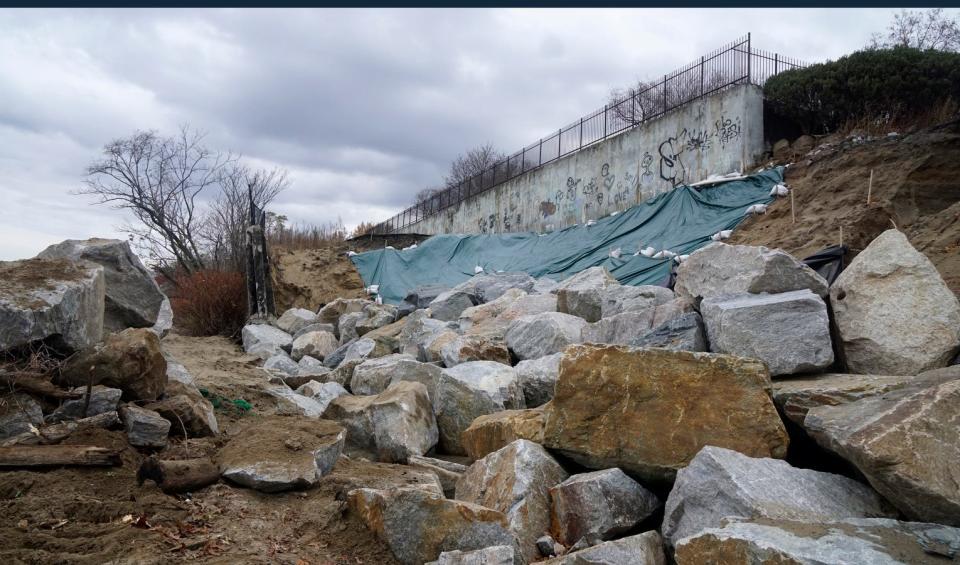
East Providence
Total expected: $27.8 million
Total committed: $2 million
Where the money is going: Nearly $990,006 is being used to pay salaries for city employees, including three police officers, two police dispatchers, a library youth services assistant and assistant director, a planner, four laborers for the highway department, and part-time workers at the animal shelter and Crescent Park Carousel.
East Providence has also budgeted close to $483,800 for repairing the seawall at Rose Larisa Park, which dates back to the 1900s and is at risk of collapsing.
Additionally, $210,000 has been set aside for sewer improvements, $162,683 will go toward the initial planning stages of overhauling the city's wastewater system, $158,900 will fund flood-prevention efforts along the Runnins River, and $56,000 will pay for IT upgrades.
What's next: Future spending will likely include loan and grant programs for small businesses and creating an "incubator space to support small business innovation and startups," said Patricia Resende, a spokeswoman for Mayor Bob DaSilva.
Exeter
Total expected: $1.9 million
Total committed: $0
What's on the table: "There’s been very preliminary discussion about modifying town hall to increase COVID-19 protections and practices for taxpayers, visitors, and staff," Ken Findlay, the assistant to Exeter's Town Council, wrote in an email.
What's next: The Town Council is "currently gathering information in order to determine the best method for engaging the public so all town residents have input," Findlay said.
Exeter does not have a town administrator, manager or mayor, so all discussions take place during Town Council meetings, he added.
Foster
Total expected: $1.4 million
Total committed: Approximately $36,000
Where the money is going: Foster has approved spending close to $25,000 to put land evidence records online, approximately $8,000 for an e-permitting system, and a onetime $3,000 stipend for the director of the town's emergency management agency, according to finance director Kelli Russ.
What's next: In total, Foster expects to spend about half its ARPA funds to cover expenditures related to public safety, which will free up money in the general fund that can then be used to build the town's new police station, Russ said.
The Town Council has held two public workshops to discuss ideas for spending the remaining funds and intends to advertise a third in January, Russ said. A plan will be finalized early next year.
Potential uses of the money that have been discussed include financial assistance to nonprofits such as Foster's volunteer fire companies, ambulance corps and food pantry; repairing the town's iconic covered bridge; bonuses for other employees and volunteers; a new communications tower; defibrillators; improvements to the fairgrounds and surrounding area; and streetscaping.
Also on the list, Russ wrote in an email, is "a well at the new Recreation Site" and "a consultant to provide the Town with a study to evaluate and define a sense of place on Rte 6 regarding the streetscape and overall character and to provide a market study for Economic Development."
When the town's current budget was adopted, Foster discussed the possibility of improving ventilation and spacing in Town Hall and investing in a video recording system for meetings. Both items remain under discussion, and no spending has been formally approved, Russ said.
Glocester
Total expected: $3.1 million
Total committed: $0
What's on the table: Ideas currently under consideration include retrofitting three rooms in Town Hall with audiovisual equipment so that meetings can be recorded, said Finance Director Adam Muccino. The funding can be used to replace revenue that was lost during the pandemic, allowing towns to fill budget holes, so Glocester is also considering setting aside a portion for that purpose.
What's next: Glocester posted a survey asking residents for their input in September, Muccino said. They're also able to weigh in at regular Town Council meetings. There's no specific timeline for when the town will make a decision about how to use the money, other than the December 2024 cutoff set by the U.S. Treasury.
Hopkinton
Total expected: $2.4 million
Total committed: $0
What's happening: Right now, every aspect of Hopkinton's plans for the ARPA funds is up in the air. The delay is partly due to the fact that Finance Director Brian Rosso has also been serving as the acting town manager, essentially doing double duty.
"Due to my schedule, while filling both positions for the last year, I am just now engaging in conversations with the Town Council about the ARPA funds," Rosso wrote in an email. "We have been taking our time to evaluate the final ‘Final Rule’ and see what other guidance comes out before making any big decisions.
Jamestown
Total expected: $1.6 million
Total committed: $0
What's happening: Public workshops to get residents' feedback on the best way to spend the money will begin taking place between mid-winter and early spring, said Town Administrator Jamie Hainsworth.
Johnston
Total expected: $8.8 million
Total committed: Unknown
What's happening: Johnston Mayor Joseph Polisena and Finance Director Joseph Chiodo did not return calls seeking information about how the town plans to spend its millions.
Lincoln
Total expected: $6.6 million
Total committed: $300,000
Where the money is going: $125,000 has been allocated for drainage improvements and road repairs on Smith Street, according to Lincoln Town Administrator Philip Gould. Another $175,000 has been set aside for repairs to Barney Pond Dam.
What's next: Gould, who was elected in September, said he anticipates that Lincoln will use most of the money to replace revenue that was lost because of the pandemic. (As the home of Bally's Twin River, the town can use the ARPA funds to make up for what it would have otherwise received in table game revenue.)
Other potential projects include improvements to the town's sewer infrastructure, including updating the software that manages the sewer system; purchasing LED streetlights; upgrading IT equipment; and improving parks and recreation facilities. The town is also considering using the funds for repairs to the Handy Pond dam.
Little Compton
Total expected: $1 million
Total committed: Unknown
What's on the table: Town Administrator Antonio Teixeira did not respond to requests for information by press time.
However, records show that Little Compton held a public meeting in September to get input on proposed projects, including upgrading water and sewer pipes to town buildings, addressing problems with the town's leaching field, improving internet service, restoring antique streetlights in Adamsville and the Commons, and accelerating the schedule for road repairs.
Other ideas listed on the agenda included upgrades to Town Hall, the public safety complex and the current public works building; and giving the Little Compton Community Center money to renovate its kitchen so it can "improve services to seniors and allow emergency shelter and warming/cooling center."
What's next: According to Little Compton's website, next steps "will involve the Council developing a final list of projects for ARPA funding. A date for this is TBD."
Middletown
Total expected: $4.75 million
Total committed: $0
What's on the table: Middletown's beach commission has suggested using the funds to do "extensive repairs" to the boat ramp at Third Beach and install a dock, according to Public Affairs Officer Matt Sheley.
The planning board has also recommended extending public water service to the east side of Middletown, where many homes rely on well water.
Other ideas that have been proposed range from improving water quality in Bailey Brook and the Maidford River to beefing up affordable housing and providing more assistance to homeless students.
What's next: Middletown will likely make a decision early next year about how to spend its ARPA windfall.
That timeline has been delayed slightly in order to give community members more opportunity to provide input, Sheley said. The town held a public hearing to solicit ideas earlier this month and plans to hold a second on Jan. 3.
Residents can also submit ideas through an online form between now and Dec. 17. The town has "put a full-court press" to encourage people to weigh in, Sheley said, and also distributed print copies of the form at the senior center and the library, and in its newsletter for residents.
Narragansett
Total expected: $4.6 million
Total committed: $0
What's happening: Narragansett recently launched online surveys targeting residents and business owners to gather more information about their needs and priorities. The responses will be presented to the Town Council at a future work session on a yet-to-be-determined date, said Finance Director Christine Spagnoli.
While there's no concrete timeline for deciding how to use the money at this point, Narragansett typically budgets for major projects in its capital improvement plan each spring. Projects funded with ARPA money will be included as part of next year's plan, Spagnoli said.
Newport
Total expected: $7.3 million
Total committed: $163,184
Where the money is going: Newport is spending $161,684 on technology that will allow public meetings to take place in person and online at the same time, said Finance Director Laura Sitrin. Approximately $1,500 was set aside for a "vaccine volunteer appreciation lunch."
What's next: The city put out a call for ideas along with an online survey for residents and business owners in September and is currently reviewing the results, Sitrin said.
New Shoreham
Total expected: $307,874
Total committed: $0
What's happening: New Shoreham has a different dilemma than most communities: It's receiving far less ARPA funds than any other municipality. (Little Compton is getting the second-smallest amount but is still receiving more than $1 million.)
"Not that we aren't glad to have these dollars available and that we won't deploy them in the most effective and efficient way possible, but they're not as material, I would say, to our overall financial picture as a lot of communities," Finance Director Amy Land told the Town Council earlier this month.
Some council members expressed a desire to get a better sense of how the funds could be used before making any decisions. The town will continue to hold public discussions about the best way to use the money, Town Manager Maryanne Crawford said.
North Kingstown
Total expected: $7.9 million
Total committed: $0
What's on the table: Among the ideas under consideration are using ARPA funds to partially fund a new recreation center, provide tax breaks for small businesses, broadband improvements, water and wastewater improvements, street light upgrades, and other infrastructure needs, said Town Manager A. Ralph Mollis.
Town Council President Greg Mancini also previously suggested that some of the money could go toward creating more paths for pedestrians and bicyclists.
What's next: North Kingstown plans to invite the public to weigh in a future Town Council meeting, which likely will coincide with deliberations over next year's budget. "We are hoping to begin this discussion with the Council sometime in December or January," Mollis wrote in an email.
North Providence
Total expected: $9.8 million
Total committed: 0
What's happening: "We are currently waiting for the final guidelines on the use of the ARPA monies," Finance Director Maria Vallee wrote in an email. The town plans to survey all residents to receive their input, she said.
North Smithfield
Total expected: $3.8 million
Total committed: Unknown
What's happening: North Smithfield officials did not respond to inquiries by press time. However, Town Administrator Paul Zwolenski told the Valley Breeze in July that water-quality improvements will be a top priority.
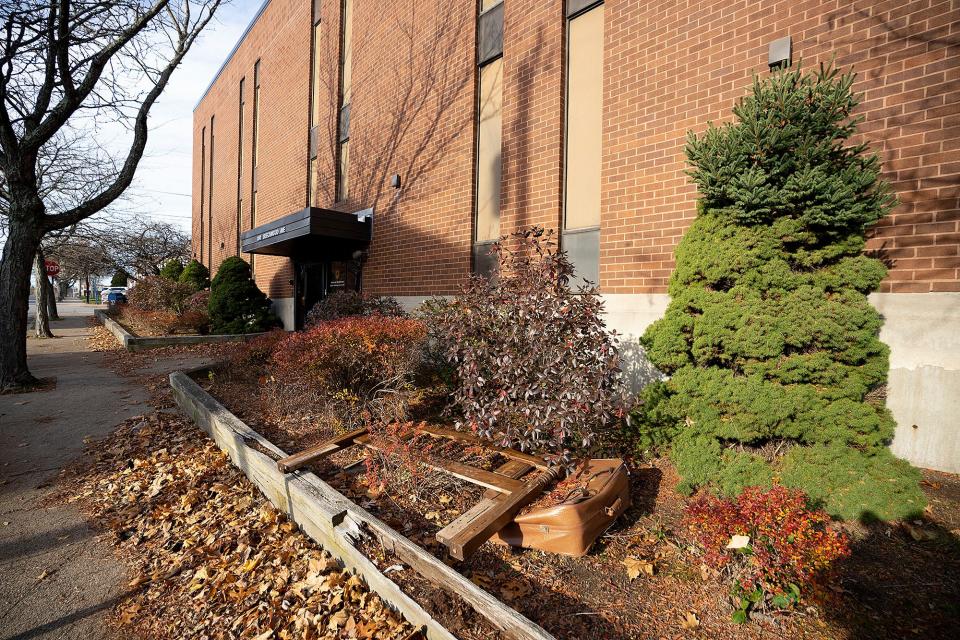
Pawtucket
Total expected: $58.3 million
Total committed: $570,000
Where the money is going: $400,000 has been set aside to purchase a vacant medical office building at 160 Beechwood Ave., and another $170,000 is going toward the cost of buying a former group home at 305 Owen Ave.
The plan is to convert both properties into affordable housing, said Emily Rizzo, a spokeswoman for Mayor Donald Grebien. Both buildings are currently vacant and owned by the state of Rhode Island.
What's next: Pawtucket sent out a community questionnaire this spring to get residents' feedback on the city's needs, and plans to send out another in the coming weeks, Rizzo said. The city doesn't have a timeline for deciding when to spend the rest of the money, other than the December 2024 cutoff, and is considering holding webinars to get more resident input.
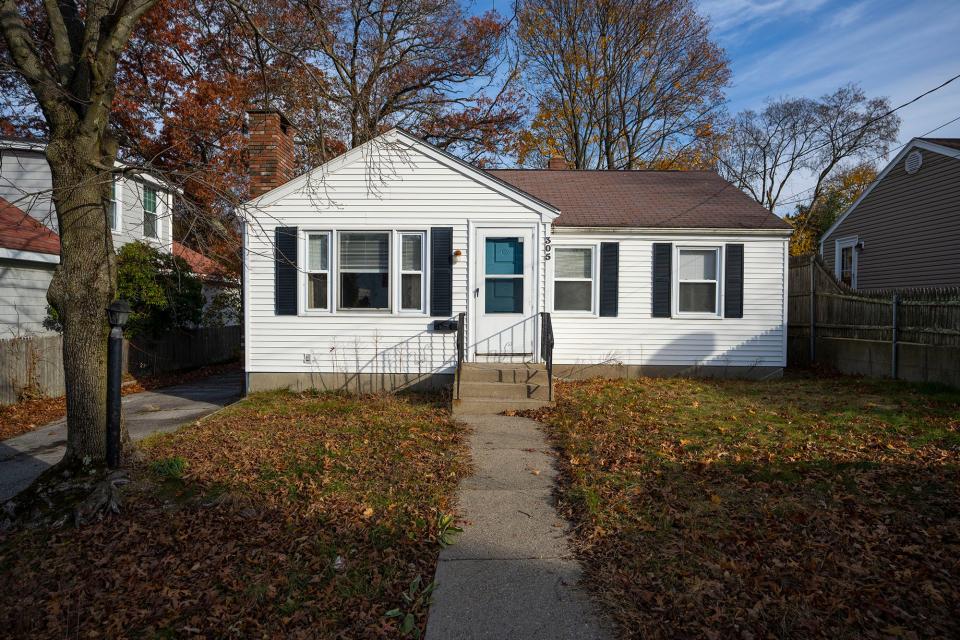
Portsmouth
Total expected: $5.1 million
Total committed: $2.2 million
Where the money is going: Portsmouth's Town Council voted on Monday to use $1.5 million in ARPA funds to start a capital fund for public safety equipment, said Town Administrator Rich Rainer. Going forward, the fund will be self-sustaining and rely on ambulance revenue.
Previously, in April, the council approved $320,000 for a new ambulance, $200,000 for a console system for fire department dispatchers, $100,000 for upgrading audio-visual equipment in the Town Council chambers, and $77,000 for software and equipment for fire dispatch.
Additionally, $20,000 has been budgeted for a fiber-optic line to connect the city's Department of Public Works with the fire department building, and $14,000 is being spent to replace desktop computers in the fire, police and public works departments. The town's emergency management department is getting $8,000 for upgrades to its operations center in Town Hall and $5,300 for a mobile command post.
What's next: Portsmouth conducted a resident survey in September and October and used the responses to formulate a list of projects to prioritize, which the Town Council also approved on Monday.
The list includes improving storm drainage in flood-prone Island Park and Portsmouth Park (estimated at $875,000 in total); providing grants for homeowners to replace their cesspools ($750,000); and upgrading water infrastructure on Prudence Island, which has been under a boil-water advisory for several years ($300,000).
Also on the list: purchasing a new street sweeper ($250,000) and police radios ($201,200); extending water mains ($118,125); establishing a climate resilience program ($100,000); and buying a trailer ($65,000), Tasers for the police department ($25,700), and a clamshell bucket for excavators ($9,000).
The council has yet to sign off on spending money on any of these items: That will happen on a project-by-project basis.
Broadband is also a priority, but the estimated cost has not been determined "because we have not identified a scope of work or action plan to address it," Rainer wrote in an email.

Providence
Total expected: $166.3 million
Total committed: $42.3 million
Where the money is going: Nearly $19.5 million has gone to the city's budget, making up for revenue lost during the pandemic. Other expenditures approved by the City Council's finance committee in June include $7 million for a small-business relief grant program; $4 million to create a new "gateway" to Roger Williams Park; $3 million for street sweeping and sewer repair; $2.6 million to create jobs for youth and fund mentoring and anti-violence programs; and $2 million for investments in early learning and broadband access for families with young children.
The city has also devoted nearly $1.7 million to summer camps and summer jobs for youth and a summertime night basketball program; $1.2 million for administrative expenses for the ARPA funds; $687,339 for grants to nonprofits dealing with mental health and homelessness; and $600,000 for libraries.
What's next: The City Council now needs to decide whether it will adopt the recommendations of the Providence COVID-19 Recovery and Resiliency Task Force, which formulated a detailed 35-page report
after holding roundtables with community organizations and local businesses, knocking on doors, and collecting surveys from more than 1,100 people.
The task force's suggestions, which incorporate the funding decisions that have already been made, include using $49.5 million to offset revenue shortfalls. The second-largest chunk of money, $28 million, would go toward creating affordable housing and preventing homelessness.
Other recommendations include setting aside $17.9 million for investments in early learning, youth afterschool and job-training programs, and community organizations. Another $15.3 million would go toward infrastructure, including broadband and cybersecurity, and $14.6 million would go toward the category of "racial equity," which includes investments in public health along with the "provision of reparations."
The task force is also suggesting setting aside $14.4 million to assist small businesses and boost economic development in historically marginalized communities; $11.5 million for "sustainability," which includes sewer repairs and creating infrastructure that can adapt to climate change; and $10.4 million for arts, culture and tourism, including grants to artists and art organizations. An additional $4.7 million would be used to administer the funds, track outcomes and ensure compliance with federal regulations.
Council President John Igliozzi said in a statement that the finance committee "will be scheduling a number of public hearings to review these recommendations and other proposals to address both immediate needs created by the ongoing pandemic, and longer-term investments that will strengthen Providence for years to come," and intends to allocate a portion of the remaining money in 2022.
Richmond
Total expected: $2.3 million
Total committed: $0
What's happening: Richmond hasn't yet advertised any opportunities for citizens to weigh in on how the funds should be used, but the town does plan to solicit their input, said Town Administrator Karen Pinch. Other than the 2024 cutoff set by the federal government, the town doesn't have a timeline for when it will decide how to spend the money.
Scituate
Total expected: $3.2 million
Total committed: $0
What's happening: The Town Council plans to make a list of priorities for the funding, according to Finance Director Karen Beattie.
Smithfield
Total expected: $6.5 million
Total committed: $0
What's happening: Smithfield intends to hold multiple public meetings to seek residents' input, said Town Manager Randy Rossi. There's not a timeline yet for making a decision about how to spend the funds, other than the cutoff set by the federal government.
The town has only had "preliminary discussions" about the funding and is waiting for final guidance from the U.S. Treasury on how the money can be spent, Rossi said.
South Kingstown
Total expected: $9.1 million
Total committed: $180,000
Where the money is going: After seeing an increase in boating activity during the pandemic, South Kingstown decided to create a full-time position for a harbormaster who will also serve as natural resource officer. (Previously, the town only had a part-time harbormaster.) The $180,000 set aside for that role will fund the position for two years.
What's next: South Kingstown has released a detailed 13-page proposal
outlining where nearly every dollar of its windfall should go.
The largest chunk of money — $6,642,500 — would be spent on improving the appearance of villages and business districts that have typically drawn tourists, including Wakefield, Peace Dale, Matunuck and Kingston. Expenditures would include traffic calming measures, improved crosswalks, new bus shelters, LED street lights, trees, banners, flower baskets and historical plaques.
Another $1,407,500 would go toward the broader category of government services. Recommendations include hiring two additional police officers, along with two paramedics who would deal with mental health crises, and a part-time behavioral health specialist for the town's summer camps. A job training program for teenagers is also on the list.
Additionally, $500,000 would go toward local nonprofits providing social services, and $400,000 would go toward affordable housing and home-repair grants.
The plan has yet to be formally adopted by the Town Council. Currently, South Kingstown is reviewing proposals from consultants who would manage the projects and make sure they meet the federal requirements, according to Interim Town Manager Theresa Murphy.
Tiverton
Total expected: $4.7 million
Total committed: $0
What's on the table: As the Newport Daily News previously reported, Tiverton experienced a major loss of revenue in 2020 because its new casino was either closed or not fully operational for the bulk of the year, and therefore could not make its promised payments to the town.

Tiverton is looking to use $3.4 million of the ARPA funds to cover its revenue losses, Town Administrator Chris Cotta told The Providence Journal. The Town Council will vote on that plan in December or January.
What's next: Public hearings will take place to get feedback on how to use the roughly $1.3 million remaining, Cotta said.
Warren
Total expected: $3.1 million
Total committed: $19,711
Where the money is going: So far, Warren has only approved one expenditure: upgrading the audiovisual equipment used to livestream meetings from the Town Council chambers. (Other grant funds are being used to pay the consultants who helping the town decide how to spend the ARPA money, according to Town Manager Kate Michaud.)
What's next: Working with consulting firm HCH Enterprises, Warren came up with a list of 10 eligible projects and asked residents to rank their priorities in an online survey that was distributed in September.
The ideas that received the most suppor
t include expanding access to free, healthy meals for children (estimated cost to be determined), improving the appearance of storefronts on Main Street and other parts of Warren that are considered low-to-moderate income ($250,000), and filling revenue gaps in the town's budget (up to $800,000 per year).
Also on the list, but ranking lower: funding the initial costs of planning for a new fire and rescue station ($100,000-$150,000), improving broadband access ($100,000), addressing health inequities and funding affordable housing (cost TBD), measuring the impact of the pandemic on residents ($5,000-$25,000) and studying possible transportation improvements ($5,000-$1,000).
The goal is to begin presenting formal proposals for individual projects to the Town Council in January, "each with a developed project charter including timelines and metrics for measuring success," Michaud wrote in an email. "We anticipate that some projects will be able to move quickly and some will require more discussion and refinement."
Warwick
Total expected: $39.4 million
Total committed: $21.4 million
Where the money is going: Warwick saw a significant drop in revenue from T.F. Green Airport, nearby hotels and rental car centers during 2020, so the city is using $10.6 million in ARPA funds to make up the difference in its budget for fiscal years 2021 and 2022.
Another $7 million has been allocated for sewer upgrades, including expanding service to three neighborhoods on the edge of Narragansett Bay that have historically relied on septic systems and cesspools, and reducing the individual price tag for homeowners to hook up to the new lines.
Additionally, $3 million is going to upgrading the city's aging water infrastructure, and $800,000 is going toward a broadband initiative, according to Finance Director Peder Schaefer.
What's next: Decisions about how Warwick should spend the rest of its millions will be made during next year's budget process, Schaefer said. A comprehensive plan is in the works, and Mayor Frank Picozzi has indicated that he wants to see the funding primarily directed toward water, sewer and public works infrastructure, as well as recreational facilities.
After Warwick passed its current budget, the U.S. Treasury announced that ARPA funds could be used to recall employees who were laid off during the pandemic. Warwick plans to spend approximately $1 million to do so, Schaefer said.
West Greenwich
Total expected: $1.9 million
Total committed: $0
What's on the table: West Greenwich has been anticipating using the bulk of the ARPA funds for road repair and resurfacing projects, said Treasurer Danielle Andrews. But that work will have to wait until spring — and the town may opt to wait until it has the entire $1.9 million in hand, since the $900,000 it received under the first installment won't go so far.
However, "that's not set in stone," Andrews said. Now that Congress has passed a massive infrastructure bill, it's possible that other funding may be available for the road repairs that West Greenwich had in mind, freeing up the ARPA money for other uses.
What's next: The town plans to discuss how to best use the funds during the budget process, which starts in early 2022, said Town Administrator Kevin Breene.
Westerly
Total expected: $6.7 million
Total committed: $1.9 million
Where the money is going: Westerly has allocated up to $400,000 to demolish the derelict Potter Hill Mill, which has been subject to a demolition order since the 1980s; $310,000 to upgrade ambulances and purchase emergency ventilators; and $300,000 for new LED lighting at the Craig Park softball field.
Other expenditures approved by the Town Council include $250,000 for a project to reduce the amount of stormwater that flows into the Pawcatuck River; $200,000 for a study on revitalizing the Route 1 corridor; $125,000 for new lighting at the Pee Wee football field; $110,000 for a small-business grant program; and $95,000 to make up for budget shortfalls at the senior center.
The town will also be spending up to $55,000 to buy the recreation department a new tractor with a beach rake, and up to $15,000 for improvements to the Columbus Circle veterans' park and Rooney Park.
What's next: Other possible projects will be discussed by the Town Council in December, said President Sharon Ahern.
West Warwick
Total expected: $8.7 million
Total committed: $638,829
Where the money is going: The largest chunk of West Warwick's spending so far — $482,501 — is going toward bonuses for town employees who were deemed essential workers. First responders and emergency services personnel are eligible for up to $2,500, while other municipal workers can get up to $1,500. The exact amount will vary based on how much time employees spent working for the town over the last two years.
Additionally, since West Warwick has its own town-funded health insurance for employees, another $126,982 will be used to replenish the amount that was spent on claims directly related to COVID-19.
The Town Council also approved a $29,346 contract with Global AV Solutions to install equipment that allows meetings to be broadcast from its chambers over Zoom.
What's next: "We have a long list of suggestions, including but not limited to sewer infrastructure improvements, essential worker pay, mental health services, cybersecurity enhancements, and significant investment in the Town’s recreation facilities and offerings," Town Manager Mark Knott wrote in an email.
All proposals will be discussed at council meetings, but West Warwick also anticipates putting out an open call for public input at some point.
"This will be an ongoing process over the next couple of years," Knott said.
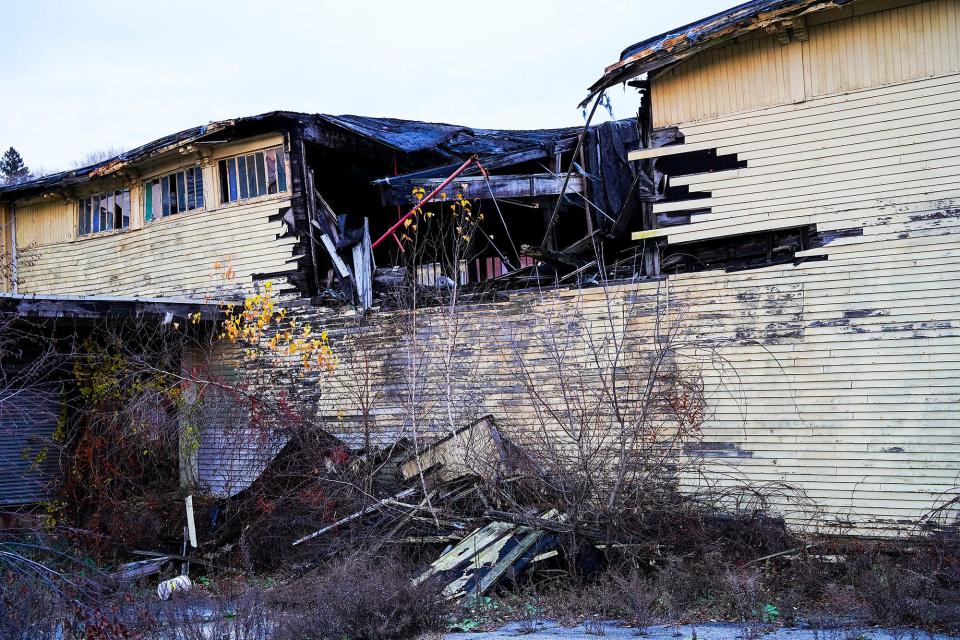
Woonsocket
Total expected: $36.4 million
Total committed: Approximately $556,000
Where the money is going: Finance Director Chris Chamberlain declined to answer questions about how much ARPA money has been spent so far, expressing frustration with The Providence Journal's previous coverage of the city's plans for the funds.
Publicly accessible records show that the City Council has approved using ARPA funds for two expenditures so far: $541,000 for reconditioning and removing lead paint from fire hydrants, and an initial $25,000 for a sidewalk-improvement project.
The council also passed a resolution authorizing the hiring an ARPA administrator at a salary of up to $90,000. However, the resolution does not specify where the funds should come from.
What's next: Woonsocket's City Council voted this month to approve the first passage of an ordinance outlining plans for spending approximately $14.1 million of the ARPA funds.
That total includes some items that have already been approved, such as the fire hydrant project. It increases the total amount budgeted for the sidewalk-improvement project to $1 million, and also allocates $2.5 million for street paving and repairs.
The ordinance needs to be passed by the council a second time in order to be legally binding. Other big-ticket items include $4 million to replace water meters, $3 million to dismantle the city's old water treatment plant, $665,183 for LED streetlights, and $375,000 for blight removal.
Controversially, the proposal also includes an estimated $250,000 for an ice rink with synthetic ice, $70,000 to replace ornamental streetlights, and $53,000 for an item listed as "ergonomic council chamber desk seats for Harris Hall and refurbishment of second floor conference room.”
Councilman James Cournoyer has said that last item is described incorrectly and that the goal is to purchase a new dais desk for the council, not chairs.
Other suggested expenditures include $150,000 for upgrading the stage at WWII Veterans Memorial Park; a total of $134,553 in bonuses for essential workers; $90,000 for backup generators; a $86,400 salary for ARPA administrator Paul Luba; and $77,000 for an electronic street signage board and a sign marking the entry to the Oak Grove neighborhood.
The plan also budgets $50,000 for updates to the city's animal shelter, $25,000 for treasury department IT equipment, and $1,271 for a SurveyMonkey subscription.
Correction: This story has been updated to reflect the fact that Central Falls' city council will not be voting on ARPA spending. It has also been corrected to reflect the fact that East Providence has not allocated any money towards replacing lost revenue.
This article originally appeared on The Providence Journal: How each RI town is spending ARPA money

